This post is dedicated to those whose contributions have significantly supported LookingCloser.org in recent years: the site’s muse Laure Hittle, and executive producers Chris Angus, Benjamin Bronsink, Kimberly Fisher, Timothy Grant, Cynda Pierce, and Julie Silander. Thank you so much, my friends!
After living on a diet of Disney+ for years, film critic Cravis Frankly has returned — mostly because he’s curious about Everything Everywhere All of the Time. I was happy to see him and encourage him to expand his cinematic horizons a little.
Frankly:
Why does this review look different from your usual reviews?
Overstreet:
What better way to review the year’s best multi-verse movie than with multiple accounts of multiple viewings?
Frankly:
Okay, but I’m late getting to this movie because I always prioritize what the box office tells me to see. I’m a puppet you see. I go where the Mighty Hand of Marketing tells me to go. And I haven’t seen much promotion for this one. But I’m curious because the Honest Trailers video for Doctor Strange in the Multiverse of Madness praised Everything Everywhere All at Once as the far superior multiverse movie. So, tell me: Will there be spoilers?
Overstreet:
The fourth part of this post will have spoilers — I will discuss the film’s controversial conclusion, as I’m seeing interpretations that trouble me. I recommend that you skip that part until you’ve seen the film. Much of art’s power lies within its capacity to surprise us. You don’t want to miss out on surprises.
Frankly:
Proceed.
FIRST VIEWING
Overstreet:
Take the title as a warning: Everything Everywhere All at Once is what you will see, hear, feel, and think about during these two hours and nineteen minutes. For audiences who need hyperactivity to stay awake and engaged at the movies, this may be hard to beat for entertainment. In The New York Times, A.O. Scott describes it as a “swirl of genre anarchy.” Daniels — that’s what the filmmaking team of Daniel Kwan and Daniel Scheinert call themselves — have rocketed from the audacious and discomforting comedy of Swiss Army Man to a similarly audacious and discomforting superhero extravaganza that feels like the next ten Daniels movies playing… well… all at once.
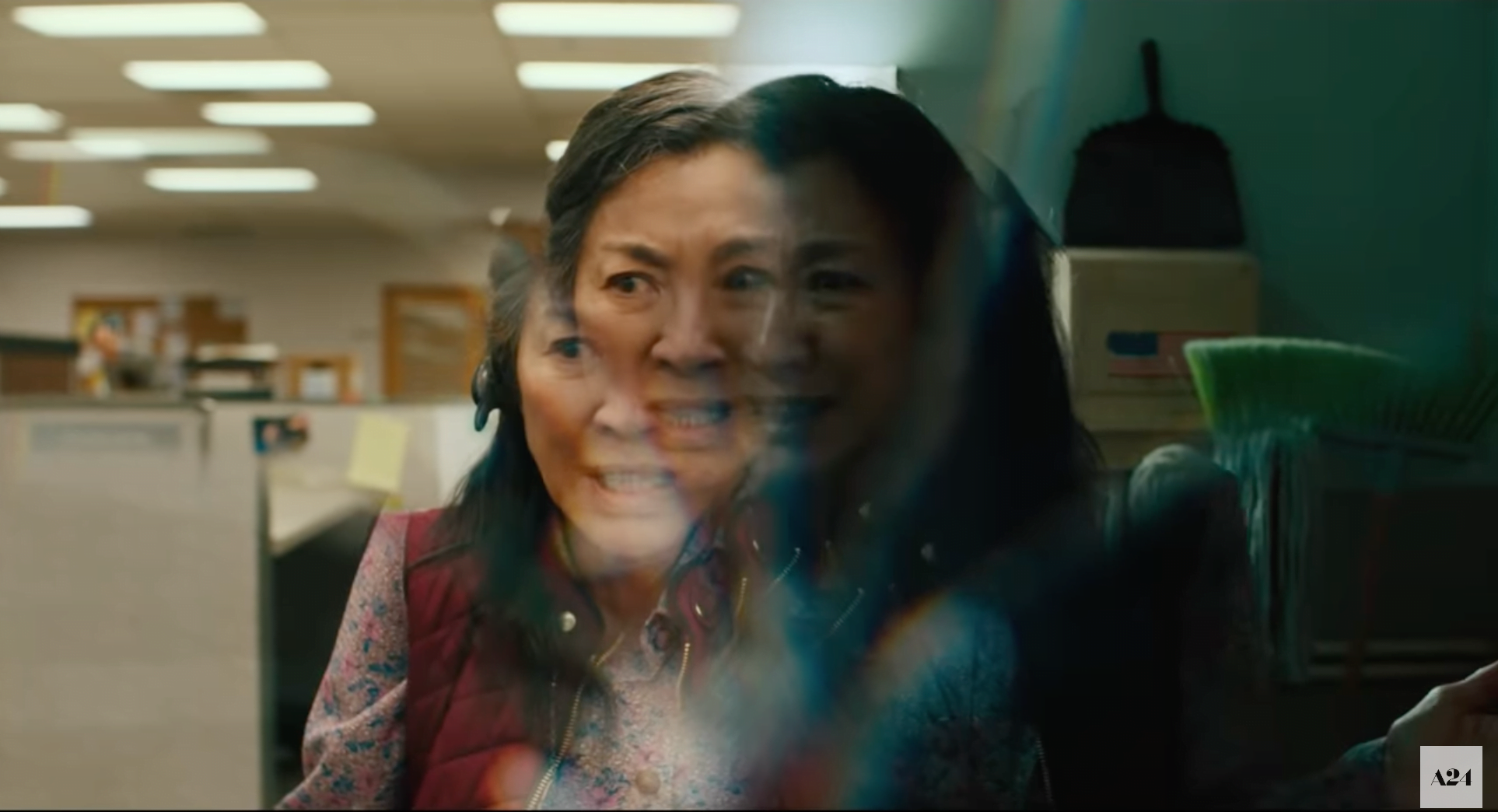
Swiss Army Man was… weird. It was like Castaway if Wilson the volleyball was replaced with the farting corpse of Harry Potter. Is this movie as weird as that one?
Overstreet:
Oh, yeah. I found Swiss Army Man off-putting abrasive — sort of show-offy in its crass brashness. Everything Everywhere has moments like that too, but the highlights outshine the more cringe-worthy moments.
Frankly:
So… what happens?
Overstreet:
Okay, buckle up. I’ll try to sum this up in one big sentence.
Frankly:
May I diagram the sentence when you’re finished?
Overstreet:
Be my guest. Here goes:
Evelyn (played by the great Michelle Yeoh) lives an exasperating life of multi-tasking as a wife trying to save her marriage to Waymond (Ke Huy Quan); a mother trying to save her relationship with her despairing daughter Joy (Stephanie Hsu); a laundromat manager trying to save the family business from an aggressive auditor (Jamie Lee Curtis); a daughter trying to take care of her declining father Gong Gong (James Hong); and a dreamer (a novelist, a singer, and more) trying to sustain her romantic hopes — but when she discovers that she is just one of countless Evelyns living different lives across an incomprehensibly complicated “multi-verse,” she must learn to advance her multi-tasking skills exponentially in order to fight a demonic power called Jobu Tupaki, a black hole that threatens to suck all meaning from the universe, and that is rapidly corrupting her daughter.
That summary only scratches the surface of everything going on here.
Frankly:
May I change my mind and not diagram that sentence?
Overstreet:
I wouldn’t blame you. Maybe one of our readers will try it. That’d be cool.
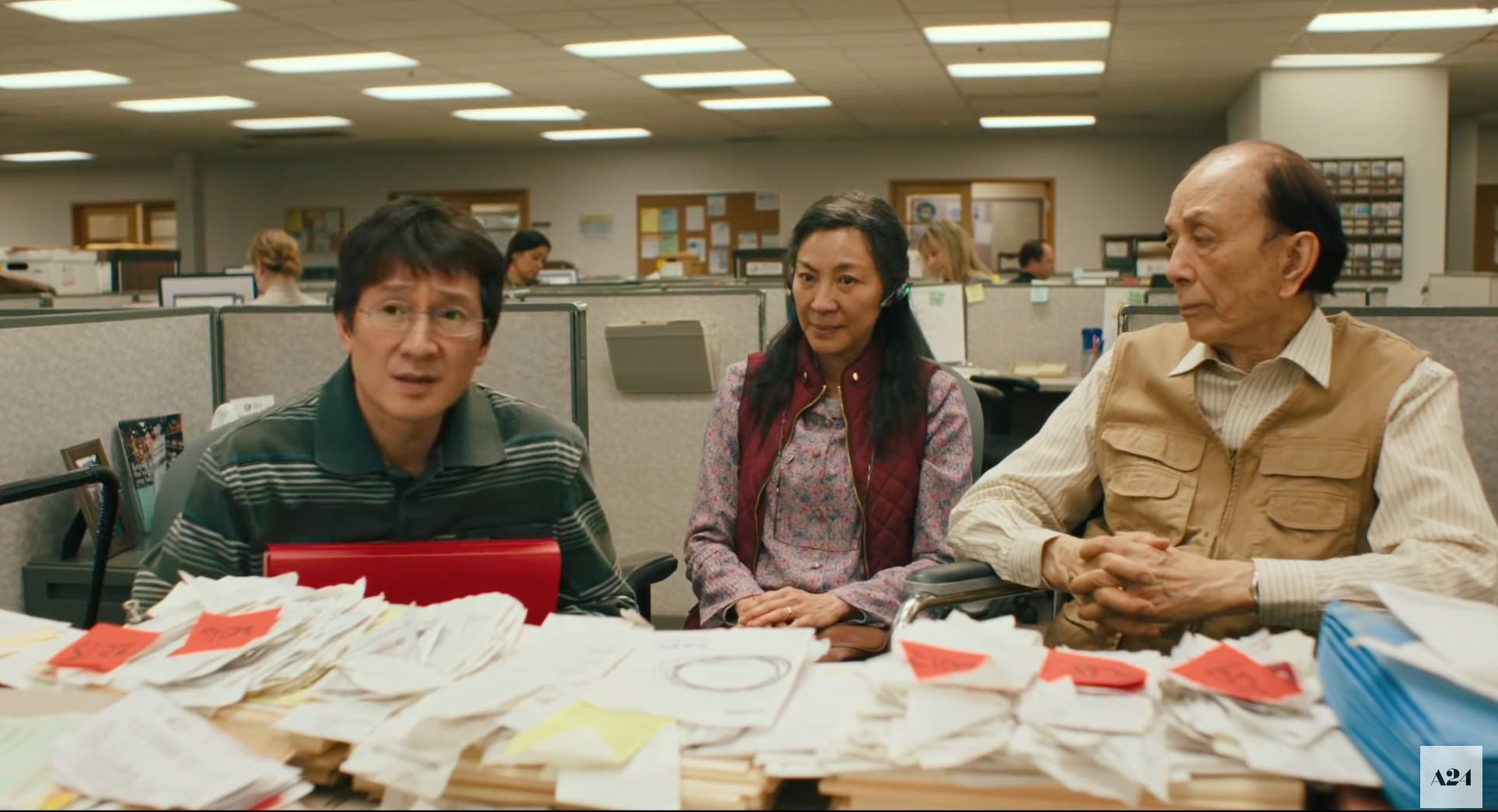
And you’re telling me that the movie works, as busy as it sounds?
Overstreet:
For what it is, it works better than I would have dreamed. It’s not “my kind of movie,” mind you — I prefer movies that give me time to think, movies that do more “showing” than “telling,” movies that prefer beauty to busy-ness. But, as fast-paced action extravaganzas go, this is pretty spectacular, and one of the best since The LEGO Movie, Mad Max: Fury Road, or Spider-Man: Into the Spider-Verse. It’s more of a rollercoaster than a book of poetry. Actually, it’s more like a whole amusement park, celebrating its influences and innovating on the Marvel movie template.
Frankly:
You don’t usually enjoy CGI fests.
Overstreet:
This isn’t a CGI fest. That’s one of its most distinctive achievements.
I haven’t even begun to talk about the Daniels’ technical achievements here. The movie moves at such high speed that viewers susceptible to seizures might want to take caution. Without much at all in the way of digital animation, the Daniels fill every inch of the screen with razzle-dazzle in a way that would probably leave Edgar Wright breathless and ecstatic. Collaborating with a small team of visual effects artists working in practical media, [Daniels] have achieved a joyous spectacle as exhausting as it is constantly surprising. There’s an indieWire piece by Jim Hemphill that will blow your mind if you read it after you see the film. Hemphill writes that the film’s feast of effects “are even more astonishing when one watches the end credits and realizes that they were not the work of a high-end post-production facility but a handful of craftspeople….” Basically, five people are responsible for most of film’s sugar-high of special effects: Zak Stoltz, Ethan Feldbau, Benjamin Brewer, Jeff Desom, and Matthew Wauhkonen. I don’t think it’s an exaggeration to say that there is more invention and imagination in fifteen minutes of this movie than there is in the entirety of any Marvel Universe movie I’ve seen.
On every other count, the film is impressive. The Son Lux score is effective, and the end-credits song by Mitski, David Byrne, André 3000, and Randy Newman — yes, you read that right — is really worth staying around for.
Frankly:
You haven’t even mentioned the thing that got my attention in the first place: The return of Short Round from Indiana Jones and the Temple of Doom! He’s really in this movie?
Overstreet:
He is, and he’s fantastic. He even gets to say and do things that are clever references to that performance from, what? Almost forty years ago!
In fact, the whole cast is uniformly fantastic — a perfect ensemble. And that’s remarkable, considering the original plan was for the film to star Jackie Chan, and then was reinvented to star Michelle Yeoh and Awkwafina. The final lineup — Yeoh, Quan, Hsu, Curtis — would all be worthy of the praise “awards-caliber work,” if awards meant anything. I mean, we already knew Yeoh was great, but who would ever have thought she could do this?! And I sincerely hope Jamie Lee Curtis is remembered at next year’s Oscar season — unlikely, but this is the funniest, bravest performance of her career.

It sounds like you really love this movie.
Overstreet:
There’s a lot to love about it. And the sensory overload of it may translate to some as greatness. It doesn’t for me — not yet, anyway. I’m not sure its adds up to much more than the sum of its parts. Its weaknesses are, for me, almost as significant as its strengths. The fast-forward action scenes are inventive and fun at first, but eventually, for me, they become headache-inducing. And it has so many jokes about butt plugs and penises and S&M that the amusement devolves into a recurring groan of “Why?!” It never pauses long enough to give us a chance to think or use our own imaginations.
Some of its all-caps messaging has me cheering — and even, in more than one scene, tearing up; this is a movie with its heart in the right place, emphasizing the importance of generational flexibility, with grandparents and parents learning to expand their worldviews in the name of love, and young people learning to hang on to hope in spite of the evidence. (Turns out, the grownups who have doomed the world might not be entirely irredeemable.) Watch for a moment when Waymond quietly reveals the secret of his strategies: “This is how I fight.” In that moment, he becomes as inspiring to me as any superhero I’ve yet seen on the big screen.
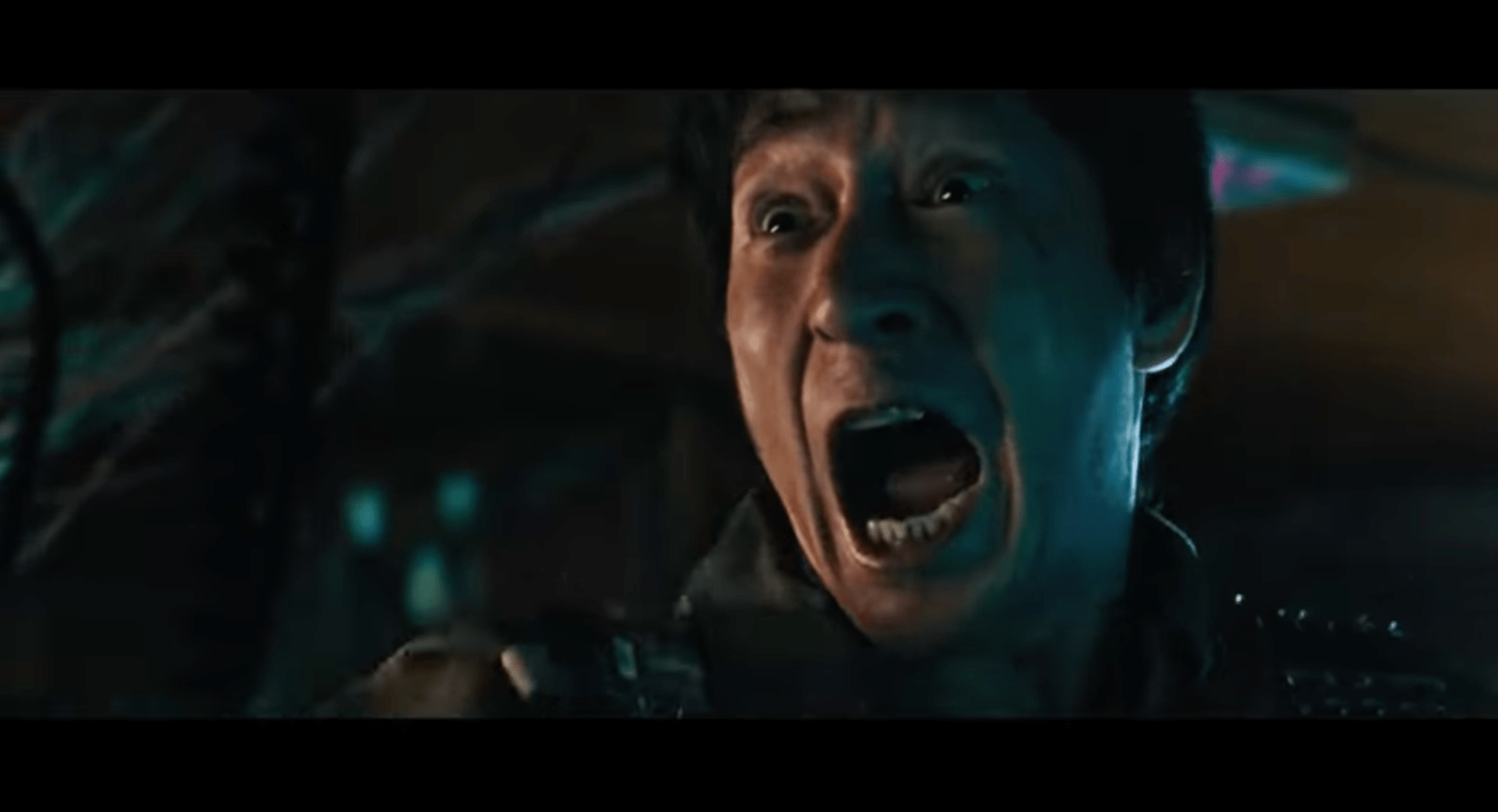
But while I can endorse much of the movie’s messaging — particularly the way in which Waymond influences Evelyn’s perspective — I can’t admire the heavy-handedness of it. For all of its imagination, this movie’s finale feels overlong and preachy. As Calum Marsh wrote on Letterboxd: “In what dimension is it remotely justifiable to have a 40-minute emotional climax?”
Frankly:
Actually, you’re making it sound like a lot of my favorites. Like Endgame.
Overstreet:
How did I know you were going to say that?
Frankly:
I go where I’m expected to go.
SECOND VIEWING
Frankly:
You went back for more?
Overstreet:
I knew I would eventually give this a second go. There was too much happening “all at once” for me to feel like I’d given it a fair assessment. So, I seized an opportunity to catch a Saturday afternoon matinee, and I’m glad I did.
I decided to focus on something other than the storytelling this time, and I was able to just relax and surrender to the waves of visual creativity. I originally rated this on my Letterboxd account at “3 1/2 stars,” and those ratings are off-the-cuff and insignificant — but I’m going to go ahead and bump it up to “4 stars” now. While the storytelling is more sophisticated, layered, and thoughtful than any Marvel movies but Spider-verse, I would count this film up there with some of the greatest achievements in visual effects. I didn’t notice a blip of digital animation — everything is done with clever editing, lots of festive and decorative props, and convincing camera tricks.
The amount of work invested here by Yeoh, Quan, Hsu, Curtis, and Hong in so many complicated action scenes, so many costume changes, so much makeup, so many stunts — it’s hard for me to fathom. There’s more visual and storytelling imagination in 15 minutes of this than in the whole of Doctor Strange In the Multiverse of Madness. If Everything Everywhere this doesn’t run away with the effects Oscar next year (and, let’s face it, it probably won’t), I’ll wonder what qualifies Academy voters to vote on this matter.

Even so, it still feels too long. The Everything Bagel finale drags on interminably, and I find myself just wanting something, anything, to wrap it all up. That’s why I’d still call Spider-Man: Into the Spider-verse my favorite multi-verse movie of all time.
THIRD VIEWING
Overstreet:
[Singing.] “Sucked … into… a baaaaaagel.” I think I’m going to be singing that line along with Stephanie Hsu whenever the terrible headlines of the day get me down.
Frankly:
You went back yet again. Why, if it annoys you?
Overstreet:
Almost everyone we know is still talking about it and Anne hadn’t seen it yet. She’s a big Doctor Who fan, so I had a feeling she’d love this. And she did.
Frankly:
Did you change your mind about anything this time around?
Overstreet:
Still too preachy; still about 15 minutes too long.
But I’m finding that it’s a great one to watch at home with someone who hasn’t seen it before. How many movies deliver such consistent surprises, so many unexpected delights?
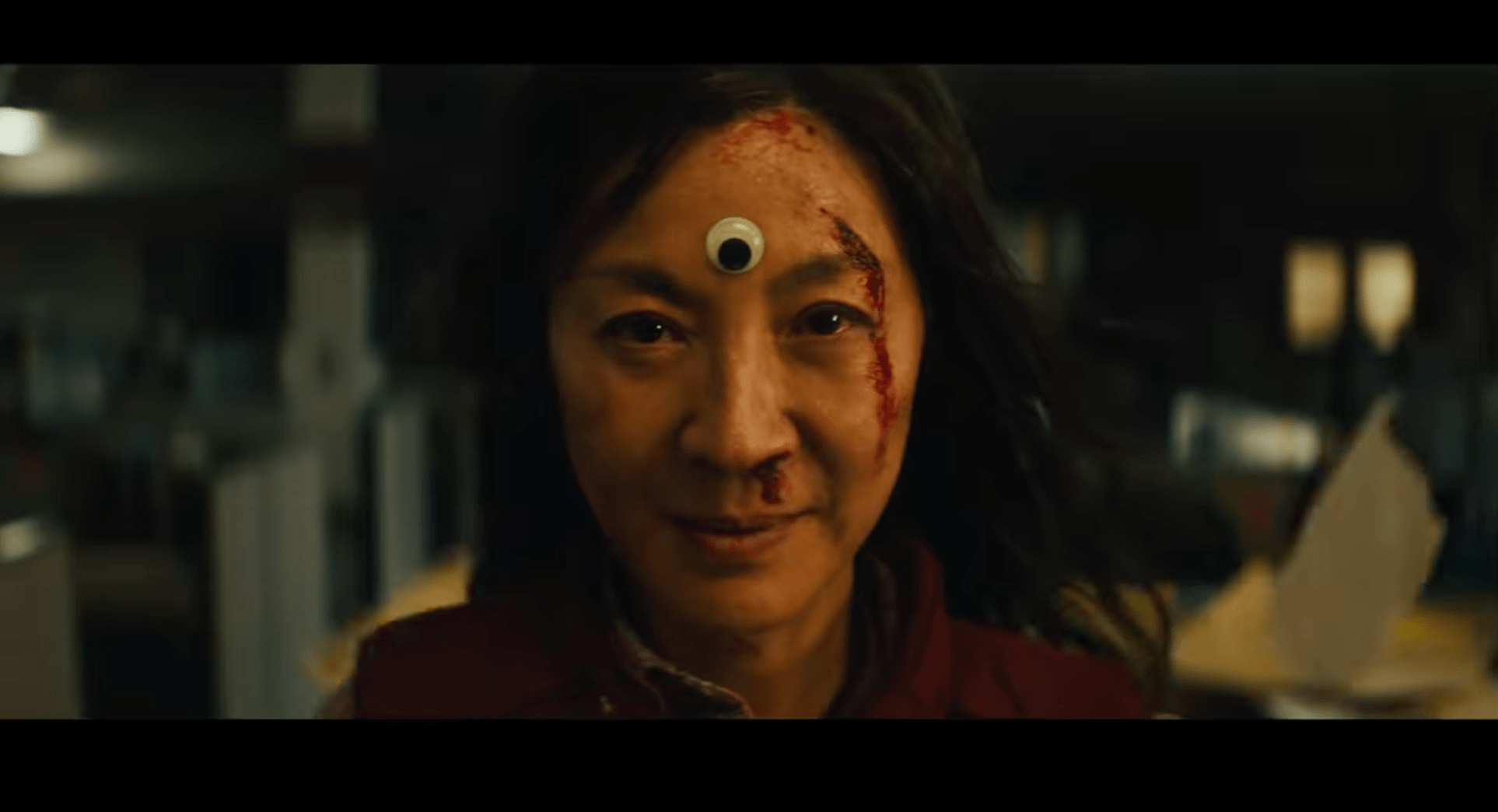
Each time I’ve seen this, I’ve enjoyed Stephanie Hsu’s performance more. And although the movie is already overstuffed, I would have loved to see more of Jenny Slate as Debbie the Dog Mom. I know some folks are worked up about Dierdre’s character strongly resembling a pre-existing character, but I’ll never stop enjoying Jamie Lee Curtis’s go-for-brokeness here.
For what it’s worth, Yeoh’s Evelyn showed up in Anne’s dreams last night, after the movie.
Frankly:
Whoa. She’s entered the multi-verse!
Overstreet:
It would seem so. She said that Evelyn, in the dream, was always at a distance. Anne and I were apparently trying to catch up with her. And then we realized that Evelyn was pregnant in this dimension. So… it’ll be interesting to see if that figures in a sequel. Whatever the case — I wish Evelyn and her new baby well.
Thoughts on the Film’s Conclusion
Frankly:
Okay, I’ve seen it now. I think the movie broke my brain.
Overstreet:
You mean… broke it worse than usual?
Frankly:
You said you have thoughts about the conclusion. I’m glad to hear that, as I found one particular line troubling.
Overstreet:
Is it the moment when Evelyn embraces Joy? When she says back to her daughter the same two despairing words that she herself, at her lowest point, was saying?
Frankly:
Yes. She says, “Nothing matters.” That bothered me. Doesn’t that make this movie… nihilistic?
Overstreet:
It bothered me when I saw it the first time. But I’ve thought about this during both the second and third viewing, and… no, I don’t think so. In fact, I think Evelyn is turning those words upside down.
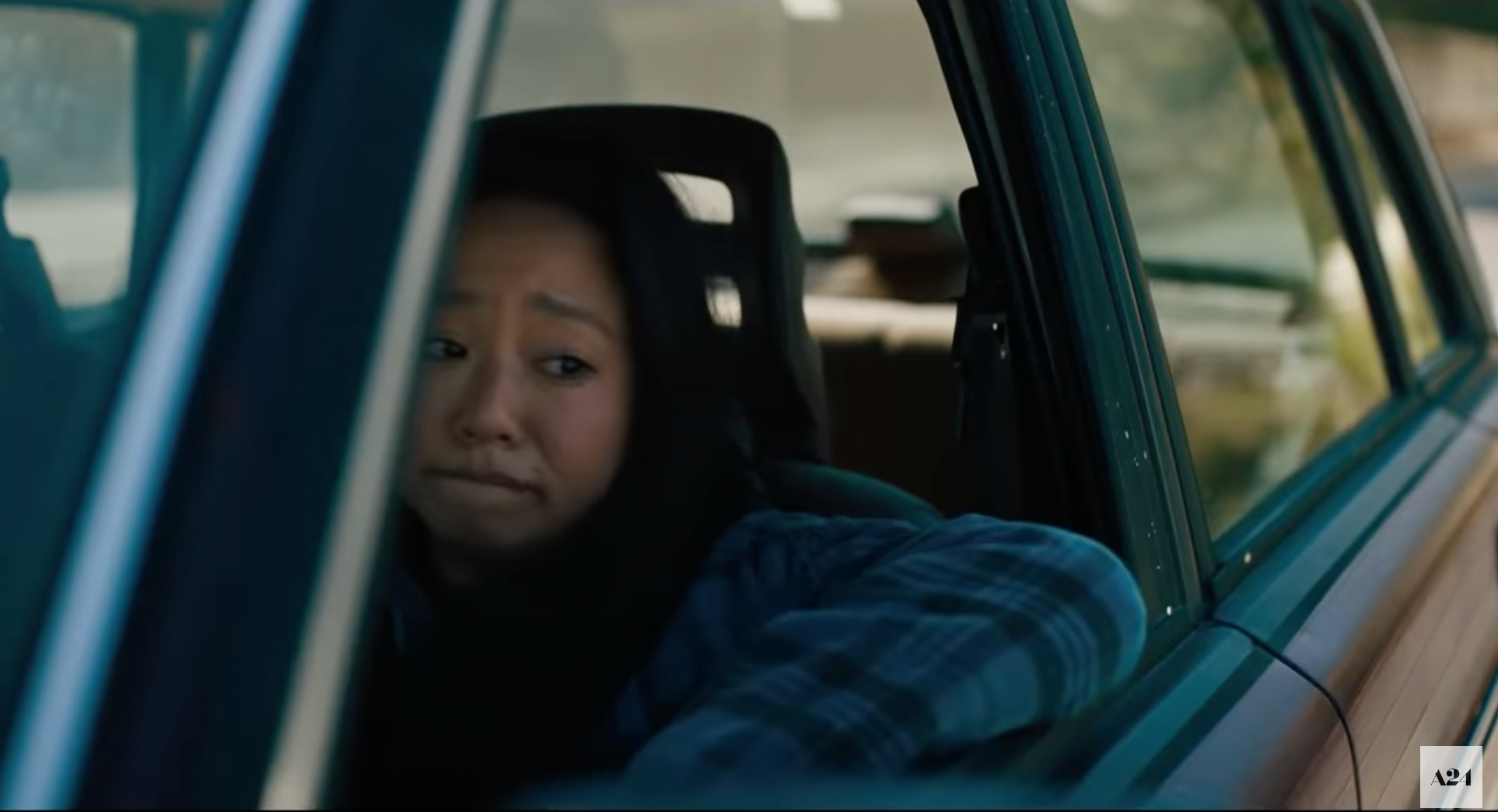
You’re not the only one worrying about this. But, contrary to what some of my friends and colleagues have called “a nihilistic conclusion,” I read Evelyn’s utterance of “Nothing matters” not as a surrender to meaninglessness, but as quite the opposite. I read it as a reassurance from mother to daughter that, no matter what happens, nothing can break her love for her daughter. All of the hard feelings? All of the failures? All of the misunderstandings? All of the disagreement? None of it matters — she will still love her daughter, still pursue her, still desire to be with her. That strikes me as an ideal culmination of their struggles. Evelyn decides to “fight” the way that her large-hearted husband Waymond has been fighting — prioritizing unconditional love and embrace over every argument.
If I’m wrong, and Evelyn’s line is meant as a surrender to the great Everything Bagel of meaninglessness, well… yes: That would mean that all of the movie’s fuss over purpose and potential and love and forgiveness implodes at the last minute. That wouldn’t make any sense to me at all. That would make it one of the bleakest and most despairing films I’ve ever seen. The film’s epilogue — “All of the Time” — doesn’t feel like that to me at all.
And thank God for that.
Anyway, thanks for the conversation, Cravis! Movies aren’t worth much if we don’t chew on them after they’ve been served to us.
Frankly:
I suppose. But may I say that my movie stomach hurts?

